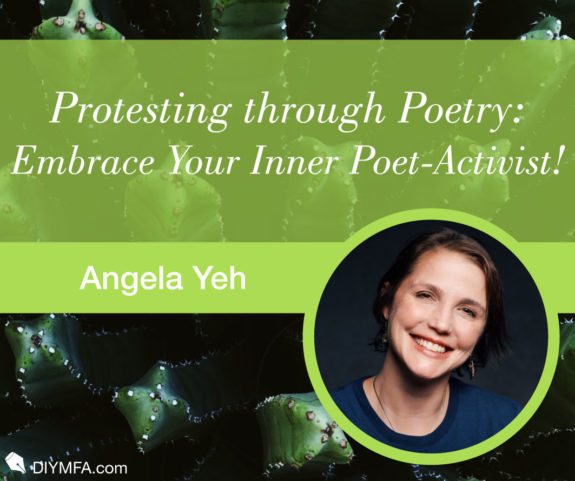I’ve been watching the war on the Ukrainian people unfold with equal parts horror and amazement. This is history unfolding before our very eyes. You guys, this is David and Goliath; it’s the Spartans and the Persians.
The people of Ukraine, and President Zelinskyy in particular, have inspired millions with their refusal to back down from the overwhelming Russian forces bearing down on them. Have you heard of the tomato jar incident? The sunflower seed incident? This astounding courage from ordinary citizens seems to come out of nowhere. Most of them don’t have weapons. (Except for a jar of pickled tomatoes). They aren’t all soldiers trained in combat.
I do not have any military training, just like most citizens in Ukraine. But you know what we do have here at DIY MFA? We’ve got bad eyesight from reading too much. And we’re pretty frisky with the words, am I right?
Poetry is Powerful
I bet you didn’t know that poetry is popular at protests and rallies. It’s true. Poetry, in particular, lends itself naturally to inspiring crowds. There is something magnetic, hypnotizing even about the cadence of spoken poetry that blends perfectly with the crowd’s energy. Just ask anyone at the Martin Luther King Jr ‘March on Washington for Jobs and Freedom’ rally in 1963 where he spoke to the crowd gathered there about a dream he had, about a better life for his children. You know, the one we still hear sixty years later every Martin Luther King Jr day.
Words are powerful – words can change our minds, our laws, and children’s futures. Poetry is quick, visceral, packing a verbal punch that is compact and powerful. Talk about a magic bullet.
Protesting through Poetry: A Long History in America
Poetry as protest has a long history in America, including the famous W.E.B. DU BOIS. Du Bois was the first African-American to earn a doctorate and was a founding member of the National Association for the Advancement of Colored People (NAACP). His influential works protested the Jim Crow Laws, lynching, and the systematic discrimination in education, real estate, and employment in America decades before the more recent Black Lives Matter movement gained ground.
If you’d like to hear more recent examples of protesting through poetry, NPR talks to poets Kwame Alexander and Nikki Giovanni on the Morning Edition program. Both poets discuss what protesting through poetry means to them, and the conversation is a lively and quick 7-minute discussion of using poetry to highlight social injustice.
If you’d like a list of protest poetry through the years, check out this piece from the Poetry Foundation on Resistance through Poetry.
Creating Protest Poetry Yourself
If this is getting you fired up to try on your poet-activist super-hero cape, excellent. Like any good poem, protest poetry has layers. It isn’t just about using words to combat violence and social inequalities. It’s also about constructing a narrative around processing the trauma of conflict. Protesting through poetry is a way of creating a litany of tools we can use to break through the shell of shock, anxiety, or guilt about surviving.
Poetry is the only therapy I know of that changes the person writing it and has the power and specific potential to change the reader’s life as well – not to mention the world in general.
If you’d like even more examples of protest poetry, the Poetry Foundation has assembled an archive of poetry about the Vietnam War, both during and after the controversial conflict. These poems were written by military veterans, medical personnel, journalists covering the war, and refugees.
If you don’t mind, I’d love to round off this piece about protesting through poetry by sharing a few poems about the war in Ukraine. First, I want to mention a poem by Simon Armitage (the UK Poet Laureate) called “Resistance” about the invasion of Ukraine. In the last few verses, Simon calls attention to the Ukrainian ‘woman in black’ who gives sunflower seeds to the Russian soldier,
‘insists his marrow will nourish the national flower’
Simon ends the poem with hope – that the air-raid sirens can’t drown out the Cathedral bells. This detail reflects a small hope, like the sunflower seeds, but it is there and defiant, as all hope is, no matter how small.
Another recommendation I’d like to share is “A Poem from Ukraine” by Vasyl Stus, who, although he passed away in 1985, is considered one of the most significant Ukrainian poets of our time. Although he isn’t speaking of the most current conflict, his line about being on the battlefield;
‘Where all my soldiers are the words I wield’ – are as relatable today as when they were written.
If reading can be resistance, then poetry can certainly (and has been) a form of protest. We can’t all fight with weapons—sometimes, all we can do is wage war with words. And, maybe, pickle some tomatoes and have them handy in a glass jar nearby? Just a thought. Although with my throwing arm, I’m likely to leave a more significant dent in a nosy drone with a well-written protest poem.
Tell us in the comments: Have you ever experimented with protesting through poetry?

Angela Yeh is an East Coast Canadian native that lives and works in the great state of Texas. Angela is a black belt wanna-be who loves to garden, write about magic, and eat cake. If you’d like to check out her first published novel, A Phoenix Rises, she will send you cookies (not cake – she’s already eaten the cake). She lives with her husband, two lovely human children, and three cranky fur babies. You can follow her on Twitter and Instagram or her website.







